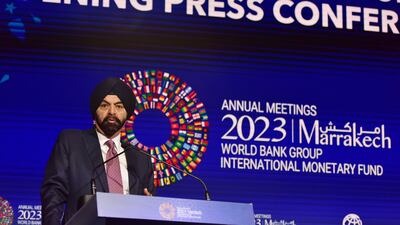The World Bank seeks to expand its balance sheet to be able to better fund development projects and plans to add an additional lending capacity of $150 billion over the next decade, its president has said.
The Washington-based lender is looking to become a better, and more efficient bank and will utilise instruments such as portfolio guarantees and hybrid capital to expand the pool of funds at its disposal for lending to developing nations, Ajay Banga told a press briefing on the sidelines of the World Bank and International Monetary Fund annual meetings in Marrakesh on Wednesday.
“A great deal of work has already gone into capital adequacy” and the lender was able to “move its loans to equity ratio that generated additional $40 billion-plus lending capacity for the next decade”, Mr Banga said on Wednesday.
The instruments such as portfolio guarantees and hybrid capital, which are also used by other multilateral development banks, are ways for countries to put capital into institutions such as the World Bank without changing the shareholder structure of the institution.
“We believe that with these instruments … we could get to $150 billion odd incremental lending capacity over the coming decade,” he said.
“If you put that in contrast to what we do every year, this is 15 [per cent] to 20 per cent additional lending capacity, which we do today.”
Although it is a substantial number, “it is not going to be enough” for the kind of challenges the world is facing today, Mr Banga said.
The World Bank, the biggest global funding institution for developing countries, is looking to grow its balance sheet and build additional lending capacity to help its clients deal with challenges including climate change, food security, health care, human and knowledge capital development and disaster recovery.
It is looking to use various instruments to increase its funding pool, as well as additional equity from shareholders to help it fund and deliver more projects.
Mr Banga said he will “definitely go back to shareholders” to seek more funding to become a “bigger” bank, “because I believe this is what the world needs”.
US Treasury Secretary Janet Yellen said on Tuesday she backed efforts to increase the lending firepower of the IMF and World Bank to combat poverty and climate change.
The World Bank's board of governors will endorse at this week's meetings in Marrakesh a new vision to “end poverty on a liveable planet”, she said at Mohammed VI Polytechnic University in Ben Guerir, north of Marrakesh.
“It has become common sense that addressing climate change and other global challenges is key to achieving development,” she said.
The US, the world’s biggest economy, has already committed large funding as part of the capital adequacy programme, however, that funding is subject to approval by US Congress.
“Am I hopeful? Yes, I am,” Mr Banga said of the Congress approval for the planned funding for the World Bank. “There will be arguments” but this is the nature of the democracy, he said.
He added that Germany has also committed funds, which has given the bank $2.5 billion in additional lending capacity.
The World Bank president said the global economy has shown itself in a “better light” with inflation trending down from last year’s peaks. However, challenges remain, and interest rates are likely to remain higher for longer, which makes investments difficult.
The rising geopolitical uncertainties and wars are also making it extremely difficult for the central banks that are trying to find a way to steer their economies towards “a soft landing”.
The mounting debt burden is also a challenge the world is facing, however, heavily indebted nations, and even those who are not in debt distress, should work hard on macro-fiscal reforms, according to Mr Banga.
“There is no doubt that debt burden hinders development,” he said. “I wish there was a magic wand”. However, it is not a simple thing to wipe the debt off for any country.
The World Bank is trying to bring all creditors to one table and transparently negotiate how to reduce debt burdens.
The idea of replacing the Common Framework – the multilateral mechanism for forgiving and restructuring sovereign debt – should be weighed carefully.
“The question is should you replace common framework with something? You should have a very clear idea what that something else is before you blow up the only thing that’s beginning to work,” Mr Banga said.
















